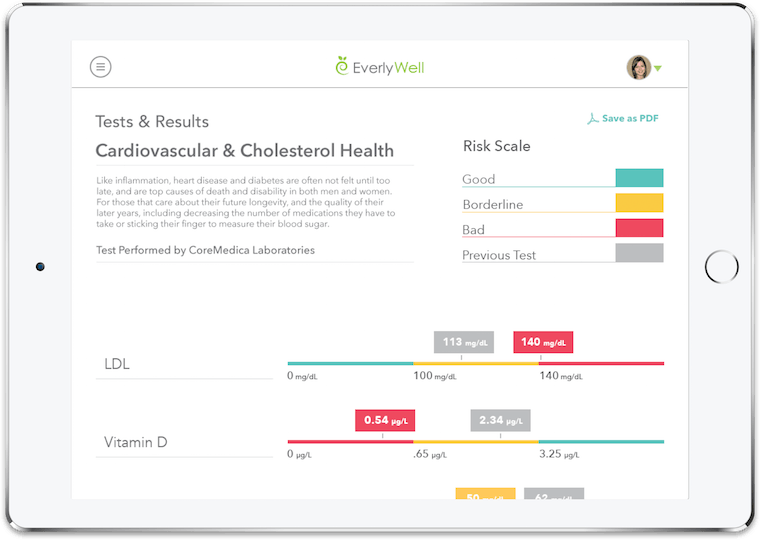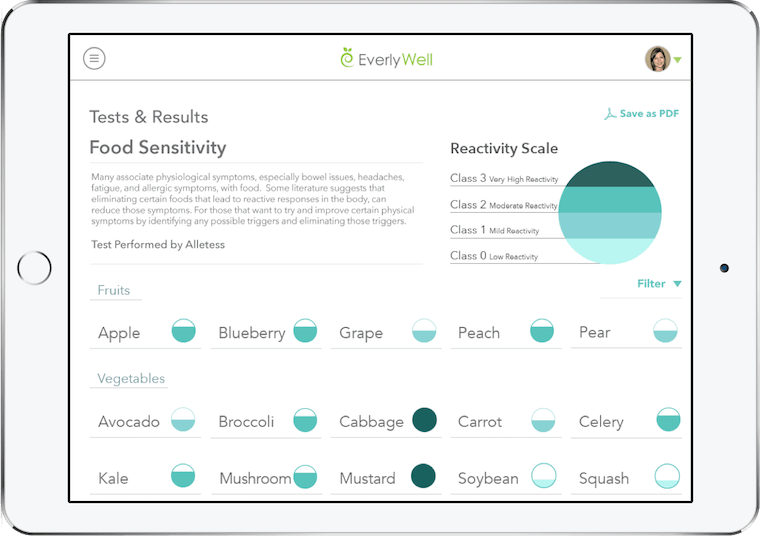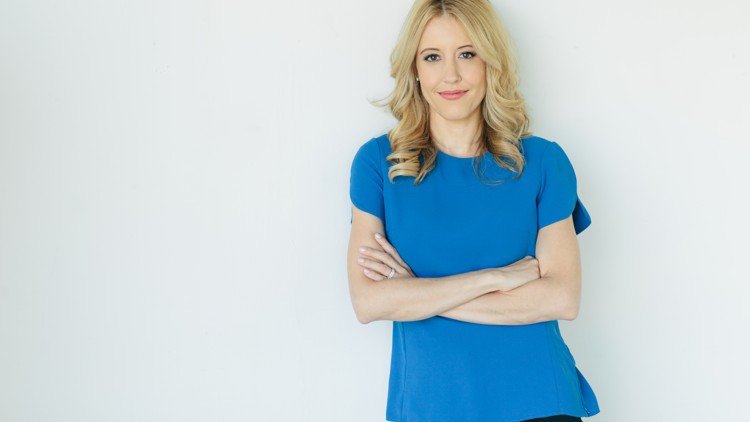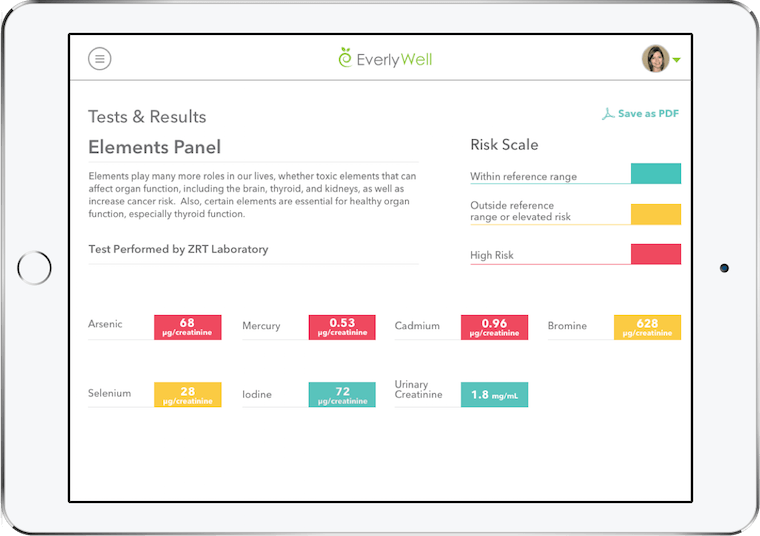The Mentality That Fuels Great Start-up Ideas, According to Everlywell’s Julia Cheek
Welcome to Fit for Business, a new column from Well+Good’s co-founder and publisher Alexia Brue. Each week, she’ll take you behind-the-scenes with the most successful healthy-living entrepreneurs around the world, so you can learn what inspires them, what challenges them, and what it’s like to work in the (booming) wellness space.
This week she’s sitting down with Julia Cheek, founder and CEO of the groundbreaking at-home medical testing company EverlyWell.
Like 80 percent of all women, I have low vitamin D. And while I know I should regularly track my levels, between work, family, friends, and dance cardio sweat sessions, checking in with my doctor gets pushed down the priority list.
Which is why health tech start-up EverlyWell caught my eye. The Austin, Texas-based company solves this common problem by giving people access to reasonably priced at-home medical tests—no appointments necessary. So you can check the status of your own vitamin D (or get a food sensitivity panel, a thyroid and metabolism test, or choose from four other equally vital, curiosity-stoking options), with results delivered in an easy-to-understand format.
No surprise that, like many other brilliant entrepreneurs, EverlyWell's founder and CEO Julia Cheek thought up the brand's idea through a “there has to be a better way” mentality. After all, sometimes being an outsider gives you the greatest insight into an evolving industry. According to the Harvard Business School grad, who launched EverlyWell last April, “Not being in health care benefits us from an innovation standpoint. I’m able to stay laser-focused on the consumer issues.”

{{post.sponsorText}}
Here, Cheek opens up about the risks she's taken—and why sticking to your guiding principles is vital for all entrepreneurs.
Where did your inspiration to start EverlyWell come from?
I’ve always wanted to start a company, but didn’t have an idea that I was passionate about spending the next several years building. Last summer, I had a really bad experience with diagnostic testing. I had unexplainable symptoms and went to several different specialists who ran every test imaginable. At the end of the day, I had a 25-page print-out filled with confusing black-and-white numbers, no follow-up from my doctors, and I spent a night googling these markers and what they meant. Not to mention I was on a high-deductible insurance plan, so none of this was covered by insurance—and the tests were about $2,000 total!
I thought there had to be a better way, and I found out that direct-to-consumer testing is permitted in almost every state, as long as you follow specific regulatory requirements. So a year ago I left my executive position at MoneyGram to build an innovative testing company with results people can actually understand.
I thought there had to be a better way, and I found out that direct-to-consumer testing is permitted in almost every state, as long as you follow specific regulatory requirements
What differentiates EverlyWell from everything else out there?
Our mission is to empower consumers to have access to, manage, and improve data about their health. We’ve transformed the testing experience to be focused on the individual. We do this in three ways: easy online ordering for test kits, at-home collection, and completely redesigned lab results that are easy to understand. As individual health ownership continues to [grow] with the success of companies like 23andMe and Fitbit, we believe that biomarker data will be increasingly important to consumers to get the full picture of their health.
Attracting talent is always a challenge. How did you convince people to join EverlyWell when it was little more than a dream?
As a first-time founder in a new and complex industry, I was worried about attracting a rock star team. I’ve worked in corporate positions and have hired and managed many teams in my past roles, so I know how important a great team is. I was looking to fill the gaps that I had, which meant putting together a team of medical and healthcare leaders, people that had successfully scaled early stage start-ups, and e-commerce and branding experts.
I was fortunate that our chief medical officer joined in the first month, and we worked as a pair to secure lab contracts, build our technology platform, and design the test panels. Once we were ready to launch in beta, I moved the company to Austin, Texas at the advice of later-stage investors, and was able to recruit superstars who had scaled start-ups before but hadn’t had the chance to be founding employees. They had plenty of experience and were ready for a new opportunity. Once I started talking about EverlyWell and the vision, honestly, the concept pretty much sold itself! We now have a team of eight full- and part-time employees.
As individual health ownership continues to [grow], we believe that biomarker data will be increasingly important to consumers to get the full picture of their health.
How did you decide whether to bootstrap the business, seek angel investors, or take VC money?
Because EverlyWell is a digital health company, I knew we’d need outside funding to make this concept a reality. When I started the company, I co-founded it with an angel investor who provided $500,000 as start-up capital to build out the concept enough to raise a seed round. After finishing our first pilot, we then closed another $2.5 million in February, which gives us about 20 months of runway to fund our launch and build significant traction before our Series A.
I approached pre-revenue VCs and angel investors while fundraising for our seed round, but ultimately went the angel investor route, even though it’s a pretty large round for angels. We had a physician entrepreneur who jumped on board to lead the round—he saw the vision and has been a great investor and board member for the company.
Can you tell us about a key decision you made that was a turning point for EverlyWell, but that frankly could have gone either way?
We had an opportunity to be acquired during the very early days of the company, before I raised our second round of funding. The deal was pretty good for four months of work, and the team was great. We ended up walking away because we hadn’t even had the opportunity to launch EverlyWell to the market.
At the time, I didn’t know how the fundraise would go, and I was turning down a good deal for potentially a very tough road. Ultimately, I had a very supportive investor who believed in me and the company we were building, and I’m so glad we stuck it out. I wouldn’t have gotten the chance to really build a company from the ground up.
“It's easier to hold your principles 100 percent of the time than it is to hold them 98 percent of the time”
What’s the best piece of advice you’ve received.
“It's easier to hold your principles 100 percent of the time than it is to hold them 98 percent of the time” —Clayton Christensen, one of my professors from business school.
To me this holds true in life and in entrepreneurship. As a founder, you set the standard for the company and the team. You’ll make a lot of mistakes, but doing the right thing—in any type of situation—is critical to building respect and being proud of your own actions.
A business owner’s to-do list is always long. Please share your favorite efficiency hack.
I prefer to manage my own calendar because I can control pacing of my strategic priorities and goals (instead of using a virtual or AI assistant). I love Mixmax for easily sharing availability, personalized mail merges, scheduled emails, etc. Our head of product told me about it, so I can’t take the credit! I also spend a lot of time on the phone, so MobileDay is great for auto-dialing into conference calls according to your calendar.
Everyone wants to know: Does EverlyWell have any open positions?
We’re always look for high-energy people who want to empower consumers to own their health! Specifically, we need interns and referral partners who earn sales commission. We will be hiring several other positions in the next year, so feel free to send a resume to contact@everlywell.com.
Also important when launching your own wellness company? Trusting your intuition, according to Bandier's founder.
Loading More Posts...



